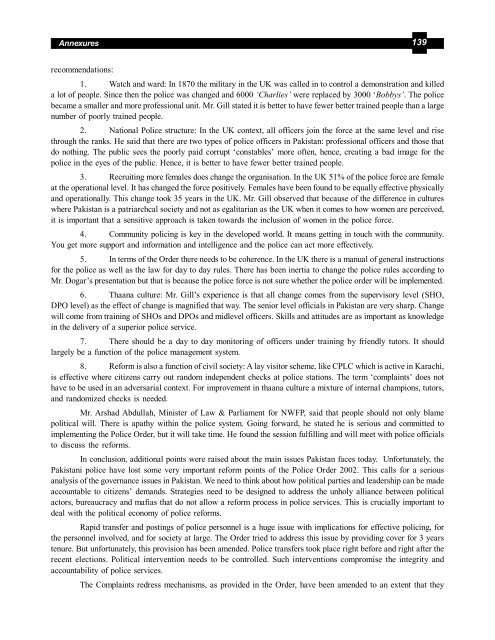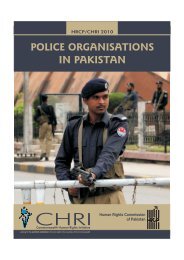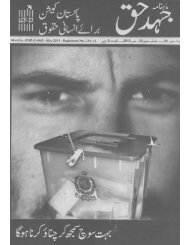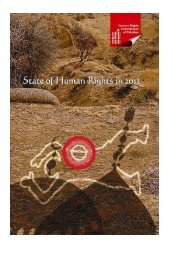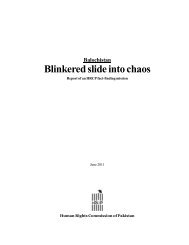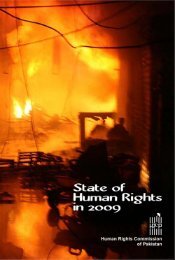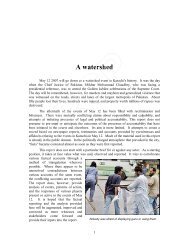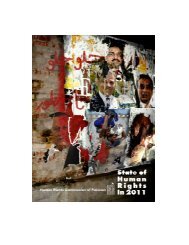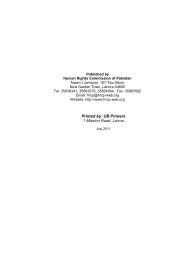Download PDF file - Human Rights Commission of Pakistan
Download PDF file - Human Rights Commission of Pakistan
Download PDF file - Human Rights Commission of Pakistan
- No tags were found...
You also want an ePaper? Increase the reach of your titles
YUMPU automatically turns print PDFs into web optimized ePapers that Google loves.
Annexures 139recommendations:1. Watch and ward: In 1870 the military in the UK was called in to control a demonstration and killeda lot <strong>of</strong> people. Since then the police was changed and 6000 ‘Charlies’ were replaced by 3000 ‘Bobbys’. The policebecame a smaller and more pr<strong>of</strong>essional unit. Mr. Gill stated it is better to have fewer better trained people than a largenumber <strong>of</strong> poorly trained people.2. National Police structure: In the UK context, all <strong>of</strong>ficers join the force at the same level and risethrough the ranks. He said that there are two types <strong>of</strong> police <strong>of</strong>ficers in <strong>Pakistan</strong>: pr<strong>of</strong>essional <strong>of</strong>ficers and those thatdo nothing. The public sees the poorly paid corrupt ‘constables’ more <strong>of</strong>ten, hence, creating a bad image for thepolice in the eyes <strong>of</strong> the public. Hence, it is better to have fewer better trained people.3. Recruiting more females does change the organisation. In the UK 51% <strong>of</strong> the police force are femaleat the operational level. It has changed the force positively. Females have been found to be equally effective physicallyand operationally. This change took 35 years in the UK. Mr. Gill observed that because <strong>of</strong> the difference in cultureswhere <strong>Pakistan</strong> is a patriarchcal society and not as egalitarian as the UK when it comes to how women are perceived,it is important that a sensitive approach is taken towards the inclusion <strong>of</strong> women in the police force.4. Community policing is key in the developed world. It means getting in touch with the community.You get more support and information and intelligence and the police can act more effectively.5. In terms <strong>of</strong> the Order there needs to be coherence. In the UK there is a manual <strong>of</strong> general instructionsfor the police as well as the law for day to day rules. There has been inertia to change the police rules according toMr. Dogar’s presentation but that is because the police force is not sure whether the police order will be implemented.6. Thaana culture: Mr. Gill’s experience is that all change comes from the supervisory level (SHO,DPO level) as the effect <strong>of</strong> change is magnified that way. The senior level <strong>of</strong>ficials in <strong>Pakistan</strong> are very sharp. Changewill come from training <strong>of</strong> SHOs and DPOs and midlevel <strong>of</strong>ficers. Skills and attitudes are as important as knowledgein the delivery <strong>of</strong> a superior police service.7. There should be a day to day monitoring <strong>of</strong> <strong>of</strong>ficers under training by friendly tutors. It shouldlargely be a function <strong>of</strong> the police management system.8. Reform is also a function <strong>of</strong> civil society: A lay visitor scheme, like CPLC which is active in Karachi,is effective where citizens carry out random independent checks at police stations. The term ‘complaints’ does nothave to be used in an adversarial context. For improvement in thaana culture a mixture <strong>of</strong> internal champions, tutors,and randomized checks is needed.Mr. Arshad Abdullah, Minister <strong>of</strong> Law & Parliament for NWFP, said that people should not only blamepolitical will. There is apathy within the police system. Going forward, he stated he is serious and committed toimplementing the Police Order, but it will take time. He found the session fulfilling and will meet with police <strong>of</strong>ficialsto discuss the reforms.In conclusion, additional points were raised about the main issues <strong>Pakistan</strong> faces today. Unfortunately, the<strong>Pakistan</strong>i police have lost some very important reform points <strong>of</strong> the Police Order 2002. This calls for a seriousanalysis <strong>of</strong> the governance issues in <strong>Pakistan</strong>. We need to think about how political parties and leadership can be madeaccountable to citizens’ demands. Strategies need to be designed to address the unholy alliance between politicalactors, bureaucracy and mafias that do not allow a reform process in police services. This is crucially important todeal with the political economy <strong>of</strong> police reforms.Rapid transfer and postings <strong>of</strong> police personnel is a huge issue with implications for effective policing, forthe personnel involved, and for society at large. The Order tried to address this issue by providing cover for 3 yearstenure. But unfortunately, this provision has been amended. Police transfers took place right before and right after therecent elections. Political intervention needs to be controlled. Such interventions compromise the integrity andaccountability <strong>of</strong> police services.The Complaints redress mechanisms, as provided in the Order, have been amended to an extent that they


